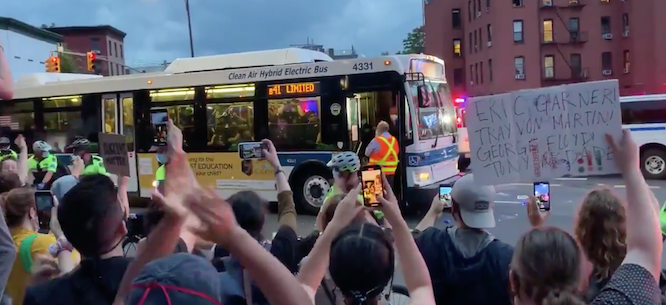The Bus Drivers’ Refusal
The Bus Drivers’ Refusal
Transit unions around the country have declined requests from police departments to transport protesters to jail.

Last Wednesday, as protests over the killing of George Floyd engulfed the Twin Cities, Adam Burch, a bus driver and member of Amalgamated Transit Union Local 1005, got a notice from the Minneapolis Police Department. Though bus service was shut down amid the protests, the MPD were asking for drivers to volunteer to drive public buses to transport the protesters that the cops had rounded up to jail, in exchange for overtime pay.
Burch, thirty-two, who had been among the protesters the day before, wasn’t having it. He posted on a local Facebook group:
This evening while at work MPD was asking for Metro Transit buses for 26th & Hiawatha. MPD was planning for mass arrests at the 3rd precinct protest and expects to use metro transit buses to transport protesters to jail. MPD has used this tactic repeatedly over the years. As a transit worker and union member I refuse to transport my class and radical youth to jail. An injury to one is an injury to all. The police murdered George Floyd and the protest against it is completely justified and should continue until their demands are met. I will encourage and try to convince all my coworkers and fellow union members to also refuse to assist MPD sending protesters to jail.
The post set off a chain reaction that brought transit worker unions into alignment with the Black Lives Matter movement and the struggles against police brutality in cities across the country.
On May 28, Local 1005 issued a statement of solidarity with the protests, declaring, “Police brutality is unacceptable! The system has failed all of us in the working class from the Coronavirus to the economic crisis we are facing. But this system has failed People of Color and Black Americans and Black youth more than anyone else.”
The national ATU stated that just as drivers could refuse work under unsafe conditions during the pandemic, “so too Minneapolis bus drivers—our members—have the right to refuse the dangerous duty of transporting police to protests and arrested demonstrators away from these communities where many of these drivers live. This is a misuse of public transit.”
Burch said he knew first-hand what happens when police use public buses like cop cars, when he protested in the wake of the police killing of Philando Castile:
I know from previous years of being involved in protests, any time that any police department in the Minneapolis-St. Paul metro area wants to make an arrest, they think that they can just expect to commandeer metro transit buses to do that. . . . That’s actually how they took me to jail in July of 2016. After the Philando Castile [killing] we took [over] the highway . . . and we were arrested, and they threw us all on the transit bus.
Now that he’s back in the driver’s seat, Burch sees both ethical and practical reasons why drivers should refuse to transport protesters.
Not all drivers refused the police’s offer. And some of Burch’s coworkers did not necessarily object on political grounds, he said. But they did feel uncomfortable with collaborating with law enforcement and “were just concerned for their personal safety. They don’t want to go anywhere near the protests, especially if [the] police are making arrests, because that just makes [the drivers] a target for the protesters. And so it’s just pretty logical: you don’t want to put yourself in a dangerous situation.”
As Minneapolis transit goes back to work, Burch’s post has now mushroomed into a Facebook group, Union Members for #JusticeForGeorgeFloyd, where workers have discussed efforts to mobilize labor against systemic racism. Burch also launched an online pledge for people to “do what we can to ensure our labor is not used to help the Minneapolis Police Department shut down calls for justice,” and to demand an overhaul of the city police force.
Bus driver unions in Philadelphia, San Francisco, New York, and Washington, D.C. have also opposed busing protesters for police. In addition, D.C.’s ATU Local 689’s statement reflected on another intersection of labor and the protests—the burning of the AFL-CIO headquarters in Washington, D.C.—asking, “What are we doing over the next few weeks to ensure that these workers out in the streets understand that the labor movement stands with them?”
This is not the first time transit workers have refused to be deputized by police. During the Occupy Wall Street protests in 2011, New York City transit workers also rejected the police’s demand that they transport protesters, and the union even sued to try to block the commandeering of buses, citing the drivers’ First and Fourth Amendment protections.
Other Twin Cities unions have come out in support of justice for George Floyd: the school employees’ union has called for public schools to cut ties to the MPD, and the Minnesota AFL-CIO has called for the resignation of the head of the Police Officers Federation of Minneapolis. (There are also broader calls to cut police unions out of the national AFL-CIO.)
Burch hopes that there is a path forward for labor to bolster the fight for racial justice in working-class communities. Noting that unions were historically militant champions of working people, he said,
when unions were really good, they were involved in these broader social movements, including the civil rights movement. They fought around the housing question for tenants’ rights. And that raise[d] an overall consciousness of the entire working class. . . . We want the broader movement to see unions as the social, progressive force that they should be, because they do represent the organized working class, which is the force that’s going to win further gains.
Michelle Chen is a member of Dissent’s editorial board and co-host of its Belabored podcast.






